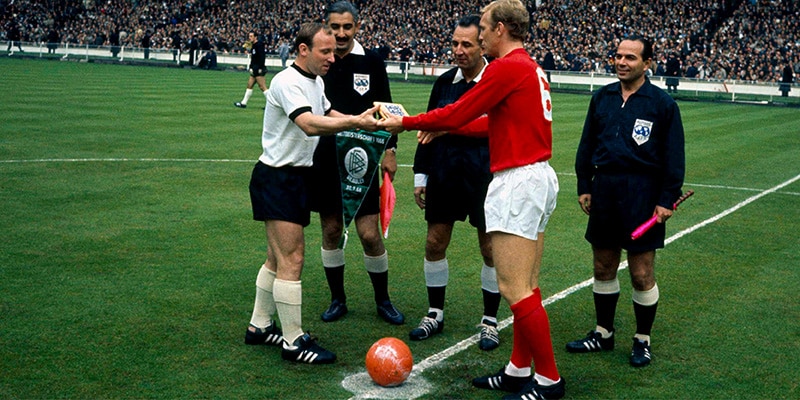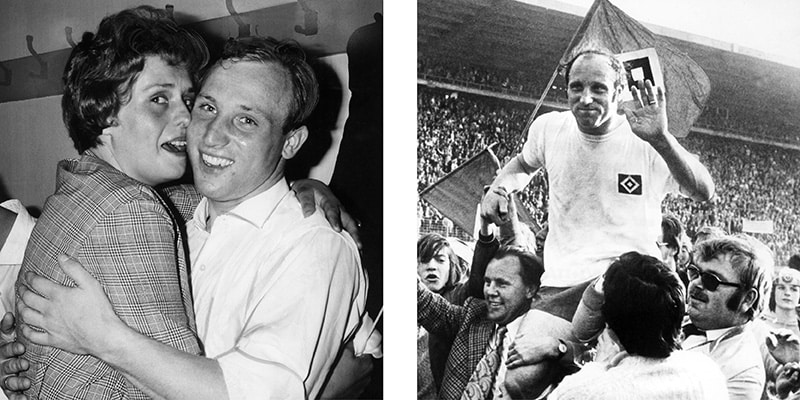
Uwe Seeler captains West Germany in the 1966 World Cup final. Offside
The countless goals scored for both Hamburg and Germany by “Our Uwe”, who died in July, were matched by off-field charm as he became a national institution
By Karsten Blaas
12 September, 2022
It is the greatest form of popularity when millions of people treat you like a close friend. Uwe Seeler, who died on July 21 at the age of 85, enjoyed this kind of reputation. The longtime centre-forward with Hamburger SV (HSV) and captain of the German national team, his nickname “Uns Uwe” (Our Uwe) defined him both as a national institution and a very likeable person.
The foundation of his fame was, of course, his performance on the pitch. He scored so many goals, it’s hard to keep count. The official statistics are 441 league and play-off goals for HSV between 1954 and 1972. On top of that, an estimated 250 in cup ties, European matches and friendlies. For Germany, he got 43 goals and in 1970 he became the first player to score in four World Cup tournaments.
Many of these goals were spectacular. Seeler was short – 5ft 7in – and stout. His team-mates called him “Dicker” (Chubby), but he was an acrobat, jumping higher than taller defenders, doing flying headers and overhead kicks. Tricks like this were rare in Germany in the 1950s and 1960s.
Off the pitch, his loyalty to his club and his hometown endeared him to the fans. In 1961, Internazionale offered him one million Mark (£83,000 at the time), and coach Helenio Herrera allegedly came to Hamburg with a briefcase full of banknotes to persuade him to move to Italy. But Seeler turned down the offer. He was afraid, he later said, to get lost in Italian football with its “intrigues”. Instead, he stayed in his house next to the HSV training ground where he lived with his wife, Ilka, and their three daughters and started working as a sales representative for Adidas. “The best thing in the world is being normal,” is perhaps the most famous Uwe Seeler quote.

Uwe Seeler celebrates with his wife Ilka after winning the German championship in 1960; the striker with supporters after playing his final game for Hamburg in 1972. Alamy/Getty
The decision not to follow the money secured his status as a hero more than anything he did on a football ground. With his down to earth attitude, Our Uwe became a role model for the West German society that sought to make up for the shame of the Second World War with hard work and a modest demeanour.
His loyalty cost him titles. He won the German championship just once, in 1960, scoring 49 goals on the way. In 1963, Hamburg won the cup and Seeler scored all the goals in a 3-0 win over Dortmund in the final. But more often, he failed to make the final step. In 1966 he was the captain of the German team that lost against England at Wembley. After Geoff Hurst’s controversial third goal, he advised his team-mates not to complain – he didn’t want the German players to misbehave in the presence of the Queen.
Another reason for his popularity were his comeback qualities. In 1965, he tore his Achilles tendon, an injury that used to terminate a career in those days. But Seeler fought his way back and scored the winning goal in the crucial qualifier against Sweden that secured Germany a spot in the 1966 World Cup. In 1968, he resigned from the national team, but coach Helmut Schön asked him to come back for the World Cup in 1970 in Mexico. There, he scored his most famous goal when he lobbed the ball over Peter Bonetti with the back of his head to take the England v Germany quarter-final into extra time.
When he retired in 1972 at the age of 35, he became a successful businessman with his own sports fashion label. He appeared in TV commercials and owned apartments and petrol stations. With his Uwe Seeler Tradition Team, he collected money for charities and established the Uwe Seeler Foundation that helps people in financial trouble. In 1995, Franz Beckenbauer talked him into taking over the HSV chairmanship when the club were in turmoil, just like Beckenbauer had done at Bayern Munich a year before. Seeler resigned after three years after allegations of financial irregularities against members of his board.
This episode didn’t damage his reputation, though. When Seeler died, HSV supporters and football fans all over Germany were in grief. Thousands of flowers, candles and club scarves were placed around his grave and at the Uwe Seeler monument that had been erected outside Hamburg’s Volksparkstadion in 2005. It is a giant bronze sculpture of his right foot. Fans have nicknamed the artwork “Our Foot”.
This article first appeared in WSC 424, September 2022. Subscribers get free access to the complete WSC digital archive
Want to see your writing published in WSC? Take a look at our pitching guide and get in touch
Tags: Germany, Hamburg, Uwe Seeler, West Germany
